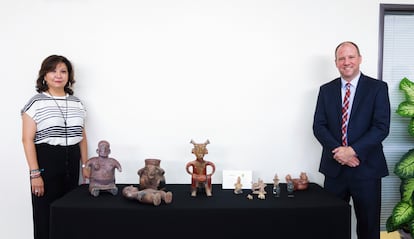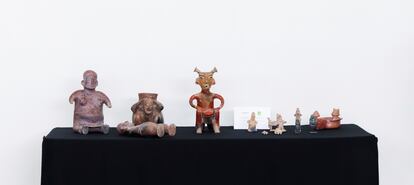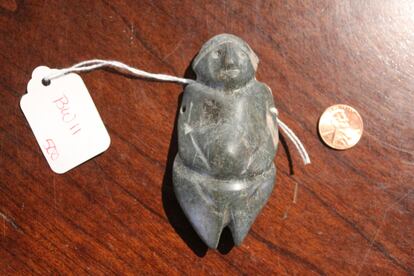Indigenous items returned to Mexico after gathering dust for years in a museum basement
The Albuquerque Museum voluntarily returned the artifacts. which were made between 300-600 BC

For 15 years, a dozen pre-Hispanic artifacts were hidden away in the basement of the Albuquerque Museum in New Mexico (USA). Five months ago, museum staff discovered them in a box and set out to investigate how these archaeological objects ended up there. They learned that the antiquities had been donated to the museum in 2007 by someone who had bought them from a woman in New York in 1985. That’s where the trail went cold, so the museum decided to return them to Mexico.
The 12 artifacts were made between 300-600 BC, according to a preliminary assessment by Mexico’s National Institute of Anthropology and History (INAH). Most of them were made in the western part of present-day Mexico. “We have identified a Chalchihuites-style piece, a Tuxcacuesco-Ortices-style piece, and an Comala-style effigy vessel from the Tumbas de Tiro cultural tradition,” stated Mexico’s Ministry of Culture.
According to the AP news agency, the effort to research the artifacts’ origins began over five months ago when they were discovered sitting in a box in storage. A donor had given them to the museum in 2007. “Immediately alarm bells started going off in our heads” when they saw the label ‘pre-Columbian’,” said Andrew Rodgers, president of the Albuquerque Museum Foundation.

Museum staff tracked down the original dealer – a New York woman in her 90s who still had the original notecards from the items’ sale to the donor in 1985. She said they either were purchased from a roadside stand in Mexico or from dealers in New England. “I don’t think anybody had mal intent. I just think there was not much clarity or much transparency in that sort of a practice 30, 40, 50 years ago,” Rodgers said.
After archaeologists from the University of New Mexico and Emory University in Atlanta (Georgia, USA) authenticated the artifacts, the museum contacted the Mexican consulate in Albuquerque, and turned over the artifacts at a ceremony on July 27. Consul Norma Ang thanked Rodgers for voluntarily returning the pieces, and said that it “should raise awareness about the ethics and importance of restitution of national patrimony.”
Since President Andrés Manuel López Obrador took office in 2018, the Mexican government has recovered almost 8,900 archaeological pieces. The most recent recovery happened in late July when a family from Barcelona (Spain) anonymously returned over 2,500 pre-Hispanic artifacts. Mexico tries to raise public awareness and encourage voluntary returns, and has seen more individuals respond to their appeal than institutions.

Few museums have been willing to return pieces from their collections to Mexico, notably Montezuma’s headdress, which is kept in Vienna (Austria). However, the decolonization of Western museums is gaining traction. Germany recently began returning 1,130 Nigerian pieces from its museums. Mexican Foreign Minister Marcelo Ebrard stated in a July 26 press briefing that Mexico “has reached several agreements with foreign museums,” without elaborating further.
The Mexican government is recovering national patrimony through seizures on Mexican soil, and by attempting to stop auctions of Mexican antiquities in New York, Paris, and Madrid, a tactic that is sometimes thwarted when local laws permit the auctions to proceed. In his press briefing, Ebrard said that in the past, Mexico tried to prove that items being auctioned were obtained illegally, but now has a new legal strategy. “Our approach now,” said Ebrard, “is that the seller must demonstrate the legal provenance of the item being auctioned, and not the other way around.”
Tu suscripción se está usando en otro dispositivo
¿Quieres añadir otro usuario a tu suscripción?
Si continúas leyendo en este dispositivo, no se podrá leer en el otro.
FlechaTu suscripción se está usando en otro dispositivo y solo puedes acceder a EL PAÍS desde un dispositivo a la vez.
Si quieres compartir tu cuenta, cambia tu suscripción a la modalidad Premium, así podrás añadir otro usuario. Cada uno accederá con su propia cuenta de email, lo que os permitirá personalizar vuestra experiencia en EL PAÍS.
¿Tienes una suscripción de empresa? Accede aquí para contratar más cuentas.
En el caso de no saber quién está usando tu cuenta, te recomendamos cambiar tu contraseña aquí.
Si decides continuar compartiendo tu cuenta, este mensaje se mostrará en tu dispositivo y en el de la otra persona que está usando tu cuenta de forma indefinida, afectando a tu experiencia de lectura. Puedes consultar aquí los términos y condiciones de la suscripción digital.








































